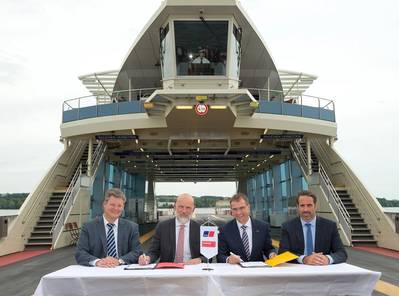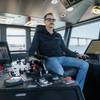
From left: Stefan Ballier, senior manager of ferry operations at the Constance utility; Dr. Norbert Reuter, head of the city of Constance utility company; Andreas Schell, CEO of Rolls-Royce Power Systems; and Matthias Vogel, Vice President Sales at Rolls-Royce Power Systems. (Photo: Rolls-Royce Power Systems)
From 2019, Rolls-Royce Power Systems and the City of Constance public utility are to begin testing the marine propulsion technology of the future on Lake Constance. This takes the form of a gas engine carrying the MTU brand. The public utility's new car ferry is to be equipped with twin eight-cylinder Series 4000 gas engines from MTU, each delivering 746 kW. This makes it the first inland waterway passenger vessel in Europe to be propelled by straightforward high-speed gas engines. The fuel will be liquefied natural gas.
Representatives from Rolls-Royce Power Systems and the Constance public utility signed the cooperation agreement on Friday. It covers a two-year trial of the propulsion system in the ferry under continuous service conditions with both partners collating data.
“Gas engines for mobile applications form a core component of our Green and Hightech initiative. This flagship project is being realized on our local ferry service between the towns of Meersburg and Constance, which allows us to demonstrate the effectiveness of our new technology and set an international trend right on our doorstep. We firmly believe that in shipping, gas engines are set to play a pivotal role as a back-up to well-proven diesel engine technology,” said Andreas Schell, CEO of Rolls-Royce Power Systems.
“The first ships were steam-powered, then diesel engines took over for roughly a century, but now gas engines are to determine the course of marine propulsion in the future,” said Norbert Reuter, head of the Constance public utility. “The shuttle service we provide between Constance and Meersburg saves some 80 million kilometres of road travel each year, and with this new ferry we are making our service even more ecologically sound.”
Compared to a diesel engine without exhaust gas aftertreatment, a gas engine emits no soot, no sulphur oxides, 90 percent fewer nitric oxides and 10 percent fewer greenhouse gases. This enables it to comply with the IMO III emissions standard that came into force last year, without the need for additional exhaust aftertreatment. It is also equal to the diesel engine in terms of performance and dynamics.
“This cooperation agreement with Rolls-Royce Power Systems marks the continuation of our partnership which now spans over 30 years. During this time we have shared our commitment to reducing emissions harmful to the environment and to strengthening Lake Constance as a region,” underlined Reuter. “Thanks to this partnership, we are assuming a pioneering role in the region of Lake Constance and beyond, since no passenger vessel on the inland waterways of Europe has yet achieved the certification we are striving for.” As he signed the cooperation agreement, Andreas Schell also lauded the new chapter being opened, and said, “Here on Lake Constance we are joining forces to set a standard for others in the industry to follow, which will gain us international recognition in the world of domestic shipping.”
Rolls-Royce Power Systems first presented its MTU-brand gas engines for marine propulsion in July 2016, and its prototype, a 16-cylinder Series 4000 unit, has now successfully completed over 4,000 operating hours on the test stand. MTU's mobile gas engines for the future are attracting considerable interest worldwide and the first pre-series 4000 units for marine propulsion are scheduled for delivery at the end of 2017. They will be dispatched to the Strategic Marine shipyard in Vietnam where they will be installed in catamarans for Dutch operator Doeksen. The public utility of Constance is to be supplied with the first eight-cylinder version of this engine.














